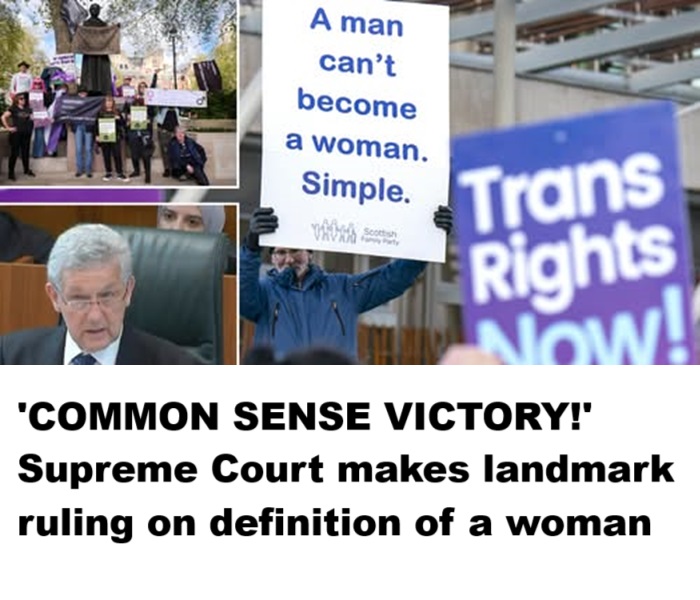Feminists are celebrating a major victory for “common sense” today after the UK’s Supreme Court declared in a landmark ruling: Trans women are not women.
After years of concerns that women’s rights are being watered down in a bid to appease trans activists, Britain’s top judges this morning unanimously agreed the terms “woman” and “sex” in gender legislation will only refer to a biological woman and biological sex.
The director of For Women Scotland – the campaign group which challenged the Scottish legislation – declared that the decision was a “victory” for women.
“This case was always about women’s rights… never about trans rights,” Trina Budge told Sky News, adding: “It’s absolutely a victory for women’s rights.”
Meanwhile, legal commentator Joshua Rozenberg said that it was a “very practical” and “common sense” decision.

The verdict will have a nation-wide impact across ‘everyday, single-sex services such as toilets and hospital wards’
PA

The ruling was read out this morning
PA
Speaking in the Supreme Court, Lord Hodge declared that it was not the court’s responsibility to create policy on the way in which transgender people should be protected by the law.
“Our role is to ascertain the meaning of the legislation which parliament has enacted to that end,” he said.
He continued: “The central question on this appeal is the meaning of the terms woman and sex in the Equality Act 2010.
“Do those terms refer to biological women or biological sex? Or is a woman to be interpreted as extending to a trans woman with a gender recognition certificate?”
He declared: “The terms woman and sex in the Equality Act 2010 refer to a biological woman and biological sex.”
In an 88-page-long judgment, Lord Hodge, Lady Rose and Lady Simler explained that while the word “biological” does not appear in the definition of man or woman in equality legislation, “the ordinary meaning of those plain and unambiguous words corresponds with the biological characteristics that make an individual a man or a woman”.
The judges added that interpreting biological sex with GRCs would “cut across the definition of the protected characteristic of sex in an incoherent way”.
They said: “We can identify no good reason why the legislature should have intended that sex-based rights and protections under the EA 2010 should apply to these complex, heterogenous groupings, rather than to the distinct group of, biological, women and girls, or men and boys, with their shared biology leading to shared disadvantage and discrimination faced by them as a distinct group.”
Since 2018, the case has been propelled by campaign group For Women Scotland, challenging the Scottish Government’s position on gender recognition, which will have significant implications for sex-based rights across Britain.
The dispute first emerged in 2022, when For Women Scotland successfully challenged the Gender Representation on Public Boards (Scotland) Act 2018 over its inclusion of trans women in its definition of women.
The Court of Session ruled that changing the definition in the act was unlawful, as it dealt with matters outside the Scottish Parliament’s legal competence.
In response, the Scottish Government issued revised statutory guidance stating that under the 2018 Act, the definition of a woman was the same as in the Equality Act 2010.
The Scottish Government also stated that anyone holding a GRC which recognises their gender as female had the sex of a woman.
For Women Scotland challenged this revised guidance, arguing that sex under the Equality Act refers to its biological meaning.
Before the ruling, director of the campaign group Trina Budge warned: “The ramifications of this case are much more far-reaching and all sex-based rights protected by the Equality Act are at risk.”
She added that the court’s decision today would impact “everyday, single-sex services such as toilets and hospital wards”.

The dispute goes back to 2018
PA
During the Supreme Court hearing, Ruth Crawford KC, who represents the Scottish Government, argued that a gender recognition certificate affected a “change in legal status”.
She said: “We submit there are only two sexes or genders, and a person whose sex becomes that of a man or woman in consequence of a GRC belongs to that sex, and will have the protection afforded under the Equality Act”.
The Government’s position is that someone with a GRC “becomes recognised as belonging to, or becoming, the sex of their acquired gender”.
The decision will impact an extensive range of areas, including single-sex spaces and services, equal pay claims, maternity policy and sports events across Scotland, England and Wales.
Aidan O’Neill KC, representing For Women Scotland, has argued for a “common sense” meaning of the words man and woman, telling the court that sex is an “immutable biological state”.
Ahead of the ruling, the Equality and Human Rights Commission, which enforces the Equality Act, has called for legal reform as a result of the case.
Meanwhile, Amnesty International has previously warned the case could be the “thin end of the wedge” which threatens to undermine other rights.
